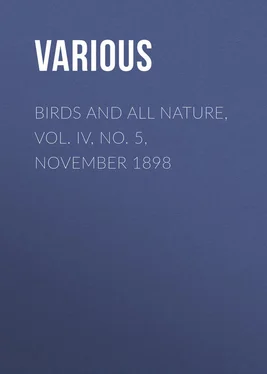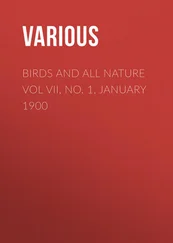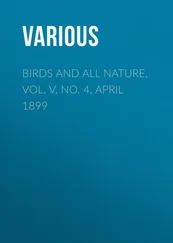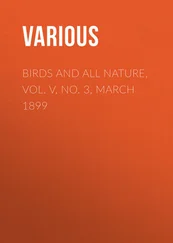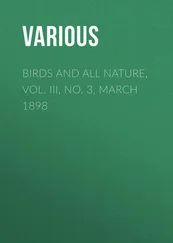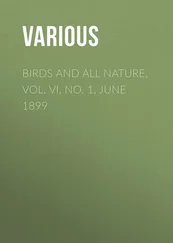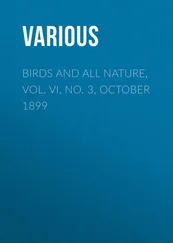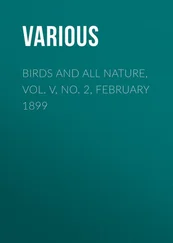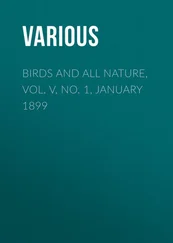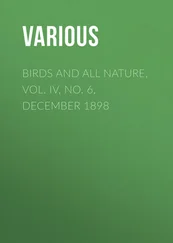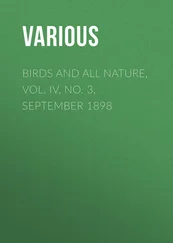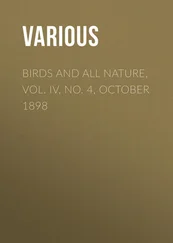Various - Birds and All Nature, Vol. IV, No. 5, November 1898
Здесь есть возможность читать онлайн «Various - Birds and All Nature, Vol. IV, No. 5, November 1898» — ознакомительный отрывок электронной книги совершенно бесплатно, а после прочтения отрывка купить полную версию. В некоторых случаях можно слушать аудио, скачать через торрент в формате fb2 и присутствует краткое содержание. Жанр: periodic, Биология, Природа и животные, foreign_edu, на английском языке. Описание произведения, (предисловие) а так же отзывы посетителей доступны на портале библиотеки ЛибКат.
- Название:Birds and All Nature, Vol. IV, No. 5, November 1898
- Автор:
- Жанр:
- Год:неизвестен
- ISBN:нет данных
- Рейтинг книги:4 / 5. Голосов: 1
-
Избранное:Добавить в избранное
- Отзывы:
-
Ваша оценка:
- 80
- 1
- 2
- 3
- 4
- 5
Birds and All Nature, Vol. IV, No. 5, November 1898: краткое содержание, описание и аннотация
Предлагаем к чтению аннотацию, описание, краткое содержание или предисловие (зависит от того, что написал сам автор книги «Birds and All Nature, Vol. IV, No. 5, November 1898»). Если вы не нашли необходимую информацию о книге — напишите в комментариях, мы постараемся отыскать её.
Birds and All Nature, Vol. IV, No. 5, November 1898 — читать онлайн ознакомительный отрывок
Ниже представлен текст книги, разбитый по страницам. Система сохранения места последней прочитанной страницы, позволяет с удобством читать онлайн бесплатно книгу «Birds and All Nature, Vol. IV, No. 5, November 1898», без необходимости каждый раз заново искать на чём Вы остановились. Поставьте закладку, и сможете в любой момент перейти на страницу, на которой закончили чтение.
Интервал:
Закладка:
Various
Birds and All Nature, Vol. IV, No. 5, November 1898 / Illustrated by Color Photography
NATURE'S ORCHESTRA
ALL nature is attuned to music. Man may seek the fields, the forests, the mountains, and the meadows, to escape from distracting noises of the city, but nowhere, not even in the depths of mountain forests, will he find absolute silence. And well for him that it is so, for should no noise, no vibration of the air greet his accustomed ear, so appalling would be the dead silence that he would flee from it as from the grave.
Even the Bugs make music. They may not be much as vocalists but they take part in nature's symphony with the brook, the Bird, and the deep diapason of the forest monarch swaying and humming to the gusts of the wayward wind. It is true that the great majority of our species of insects are silent, and those which do make sounds, have not true voices, breathing as they do through holes arranged along each side of their body, and not through their mouths, they naturally possess no such arrangement for making noises connected with breathing as we find in the human larynx.
The "buzzing Fly" and "droning Bee" are classed among nature's musicians, as well as the Cicadas, Grasshoppers, Crickets, Locusts, Katydids, and Beetles. Only the males are the musicians in the insect families – with the exception of the Mosquito, the lady being the musical member of that family – and the different kinds of Grasshoppers are provided with an elaborate musical apparatus by means of which they call their mates.
Chief among the insect performers is the Cicada, often confused with the Locust, though he does not belong to that family at all, who possesses a pair of complicated kettle-drums, which he plays with his muscles instead of sticks.
Directly behind the base of each hind leg is a circular plate of about one-quarter of an inch in diameter. Beneath each of these is a cavity across which is stretched a partition of three membranes. At the top is a stiff, folded membrane, which acts as a drum-head. Upon this he plays with his muscles, the vibrations being so rapid that to the ears of some listeners the noise, or music he engenders, sounds more like that of a mandolin than a drum. He is a black fellow with dull green scroll work over his thick body, lives in trees, and is generally invisible when he plays the drum.
The Grasshopper is the fiddler of the great orchestra, and the hotter the day the more energetically does he fiddle. The fellow with the short horns has a rough hind leg which he uses as a bow; this he draws across the wing cover, giving off the notes which he so dearly loves. Near the base of each fore wing is a peculiar arrangement of veins and cells. This arrangement differs in the different species, but in each it is such that by rubbing the fore wings together they are made to vibrate, and thus, some naturalists aver, they make the sounds which we hear.
The most easily observed of all insect musicians are the common Crickets. By placing a sod of growing grass in a cage with several male crickets, you can watch them play upon their fiddles. Upon the lower side of their wings you will see ridges like those of a tiny file, and on the inner margin toward the base from the end of the principal vein, a hardened portion, which may be called the scraper. By using the files and scrapers of their fore wings the little musicians add their notes to the universal music of the world. Ellanora Kinsley Marble.
A LITTLE BIRD
A little Bird in a tree
Made one – a man and maiden three.
'Twas not by chance that they had met!
"None see," they said; one can forget
A little Bird.
A long hot road, a strip of grass,
'Twould tempt the Fates to let it pass!
Two people linger in the walk;
There's only one to hear them talk,
A little Bird.
Long shadows stretched across the sky,
Two people parted with a sigh,
But there was no one there to see!
How do I know? and who told me?
A little Bird.
THE TURKEY'S FAREWELL
I go, but I return.
The fiery furnace has no horrors for me.
Mine is a race of martyrs. I can trace
Ancestors by the score who laid their heads
Upon the axman's block. It is a little way
We have. Why should I care to flaunt
My feathered beauty on a bare November bough?
I shall appear again in a far richer dressing.
In years to come it will be said of me,
As of my ancestors, that nothing in my life
Shed so much glory as the leaving of it.
Full many a little child that now
Is prattling at its grandma's knee shall say
In future years that of all days it holds
In the most sacred memory the one
When it officiated at
The funeral of this Turk. And now
Lest some one shall say I knew not how to die,
Let the ax fall.
BIRDS
THE BIRD is little more than a drift of the air brought into form by plumes; the air is in all its quills, it breathes through its whole frame and flesh, and glows with air in its flying, like a blown flame; it rests upon the air, subdues it, surpasses it, outraces it — is the air, conscious of itself, conquering itself, ruling itself.
Also, into the throat of the Bird is given the voice of the air. All that in the wind itself is weak, wild, useless in sweetness, is knit together in its song. As we may imagine the wild form of the cloud closed into the perfect form of the Bird's wings, so the wild voice of the cloud into its ordered and commanded voice; unwearied, rippling through the clear heaven in its gladness, interpreting all intense passion through the soft spring nights, bursting into acclaim and rapture of choir at daybreak, or lisping and twittering among the boughs and hedges through heat of day, like little winds that only make the Cowslip bells shake, and ruffle the petals of the Wild Rose.
Also, upon the plumes of the Bird are put the colors of the air; on these the gold of the cloud, that cannot be gathered by any covetousness; the rubies of the clouds, the vermilion of the cloud-bar, and the flame of the cloud-crest, and the snow of the cloud, and its shadow, and the melted blue of the deep wells of the sky – all these, seized by the creating spirit, and woven into films and threads of plume; with wave on wave following and fading along breast and throat and opened wings, infinite as the dividing of the foam and the sifting of the sea-sand; even the white down of the cloud seeming to flutter up between the stronger plumes, seen, but too soft for touch. – Ruskin.
BIRDS IN STORMS
DURING windstorms birds may sometimes be seen flying overhead at a great height. When this is observable, it is said it may be taken for granted that the upper atmosphere is comparatively quiet, and the disturbance is confined chiefly to the lower regions. Many seabirds seek the upper air of comparative quietness during tropical hurricanes. A writer in the Boston Transcript says that when a heavy wind or gale springs up, the Gulls, Terns and Petrels will fly back and forth over the water's surface, rising and falling, and uttering their peculiar cries of warning. If the storm extends too high up they will drift gradually with the wind, or fly away on the edge of the hurricane. Very often they get caught unexpectedly in the gales of wind, and they find themselves in a dangerous position. Then they struggle with might and main against the powers of the air currents. Knowing that danger and death face them if they once come under the dominion of the wind, they use all the strength and tactics they are capable of to combat the elements. A young Herring Gull, a Petrel, or a Tern thus surprised will beat up against the wind with powerful flight. It will rise high in the air, facing the gale, and making a little progress forward as well as upward. Then it will suddenly descend with rapid flight toward one side of the storm-swept path, but falling off at the same time in the direction of the blowing wind. Once more it will sweep around and face the storm, ascending heavenwards and striking desperately out toward the direction of the storm. By pursuing these tactics, the bird will gradually work itself to one side of the storm centre.
Читать дальшеИнтервал:
Закладка:
Похожие книги на «Birds and All Nature, Vol. IV, No. 5, November 1898»
Представляем Вашему вниманию похожие книги на «Birds and All Nature, Vol. IV, No. 5, November 1898» списком для выбора. Мы отобрали схожую по названию и смыслу литературу в надежде предоставить читателям больше вариантов отыскать новые, интересные, ещё непрочитанные произведения.
Обсуждение, отзывы о книге «Birds and All Nature, Vol. IV, No. 5, November 1898» и просто собственные мнения читателей. Оставьте ваши комментарии, напишите, что Вы думаете о произведении, его смысле или главных героях. Укажите что конкретно понравилось, а что нет, и почему Вы так считаете.
